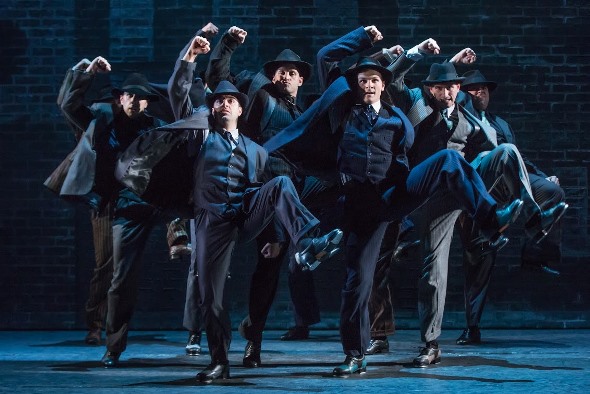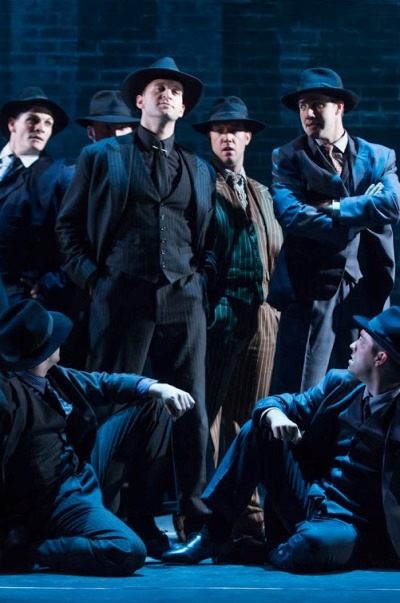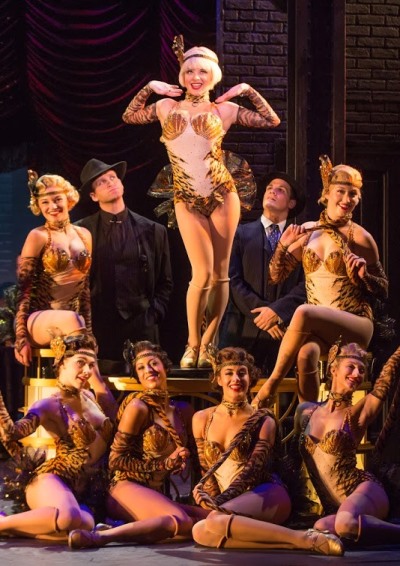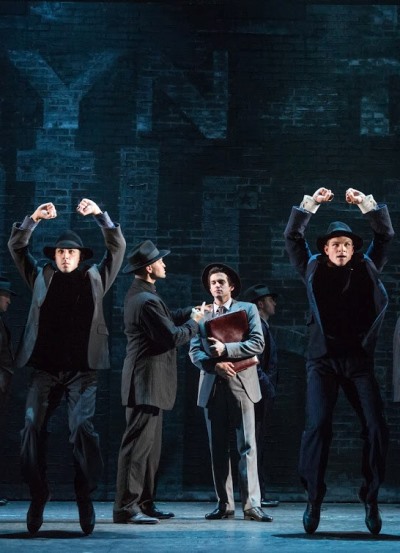In ‘Bullets Over Broadway,’ that rat-a-tat-tat could be tommy gun or sound of tap shoes
 Interview: Jeffrey Brooks portrays gangster who blossoms into genius playwright in musical presented by Broadway in Chicago.
Interview: Jeffrey Brooks portrays gangster who blossoms into genius playwright in musical presented by Broadway in Chicago.
By Lawrence B. Johnson
Cheech is just a garden variety thug, a gangster, a hit man – who proves to be the creative genius behind a hapless playwright in the musical “Bullets Over Broadway.” And Jeffrey Brooks, who plays this heavy with the fine dramatic touch, says Cheech is also “the most real character of them all, the one with the most heart.”
 Brooks co-stars in the national tour production of “Bullets Over Broadway,” based on Woody Allen’s 1994 film and directed and choreographed by Susan Stroman, that opens April 19 at the PrivateBank Theatre for a run through May 1.
Brooks co-stars in the national tour production of “Bullets Over Broadway,” based on Woody Allen’s 1994 film and directed and choreographed by Susan Stroman, that opens April 19 at the PrivateBank Theatre for a run through May 1.
Set in the 1920s, “Bullets” is Allen’s riotous take on the Broadway producing game. Lacking the financial means to stage his latest play, a young playwright strikes a deal with a mob boss for the needed backing, which comes with a proviso: The gangster’s ditzy girlfriend gets a starring role.
The boss and some of his toughs, Cheech among them, show up at rehearsals to monitor progress. It isn’t long before Cheech begins to chafe at the dramatist’s not-so-natural dialogue, and offers a few helpful suggestions. Pretty soon, Cheech is seriously into the process and the occasional tip evolves into co-authorship and a growing investment of authorial pride.
“Woody Allen goes to great lengths to portray Cheech as a goon, a buffoon who thinks with the tommy gun and his fists,” says Brooks. “The first thing we see him do is shoot someone in a turf battle. He doesn’t want to be at the rehearsal. It’s a boring situation for him. But here’s this playwright who thinks he’s a genius, and Cheech sort of comes out of left field and comments on a couple things in the script to make it more realistic: ‘No, it should be like this.’
 “As the play becomes more and more his words, he’s determined that it has to be a hit. He’s even willing to kill because someone in the cast is killing his work.”
“As the play becomes more and more his words, he’s determined that it has to be a hit. He’s even willing to kill because someone in the cast is killing his work.”
That violently protective act, says Brooks, is Woody Allen’s thinly veiled wish fulfillment on behalf of all playwrights, “something every writer has wanted to do at one time or another, to put his hands around someone’s throat, but could never actually do.”
But Brooks also recalled the cast’s early chat with Stroman about what any of them would compromise in their art. Cheech’s answer is simple: Nothing.
“As he becomes more involved in the play’s authorship,” says Brooks, “Cheech insists that his art remain pure, unmangled, the most beautiful thing anyone is ever going to see. This from a man who shoots people for a living.”
The story gets double boosts from a musical score fashioned from hits of the jazz age and Stroman’s choreography.
“It’s period music, Tin Pan Alley, right out of the gate,” says Brooks. “The audience knows immediately when and where they are. For me it’s been a learning experience. I’m a Broadway baritone, but I’d never sung jazz. I was over-singing, over-enunciating and had to ‘talk’ it a little bit more. We all had to learn to pitch our voices in a certain way to keep tension off the vocal cords. Cheech’s Brooklyn accent also adds stress.”
 While actors often describe how their performance has evolved, Brooks prides himself on having “frozen” his interpretation – much as Robert Preston famously did in “The Music Man,” replicating his nuanced performance night after night.
While actors often describe how their performance has evolved, Brooks prides himself on having “frozen” his interpretation – much as Robert Preston famously did in “The Music Man,” replicating his nuanced performance night after night.
“I don’t want it to change,” he says. “I try to be constant, unwavering, unfaltering, the one (other actors) can guide off. And still I want it to look and sound fresh every night. We’ve done more than 150 performances. The more we can keep the show the same throughout, the better we’re going to be as an ensemble.”
For the show’s taut, colorful narrative, Brooks credits its esteemed veteran director.
“Susan Stroman is first and foremost a story-teller,” he says. “She lets the choreography inform the story. The dances also define the characters. These are real people on their feet dancing, but telling you a story in that way. Many failed musicals have made the mistake of stopping, breaking off the narrative line. We move from story to dance to song and back to story. The songs just seem to come out of nowhere.
“These tap-dancing gangsters will blow you away. It oozes Susan Stroman – a perfect marriage of period and piece and the type of men we’re talking about. Men being men. Dangerous, dark men — tap dancing.”
Related Link:
- Performance location, dates and times: Details at TheatreinChicago.com
Tags: Broadway in Chicago, Jeffrey Brooks, PrivateBank Theatre, Susan Stroman, Woody Allen

